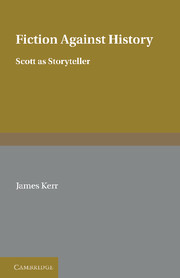Book contents
- Frontmatter
- Contents
- Acknowledgements
- A note on citations of the Waverley novels
- 1 The historical novel and the production of the past
- 2 The reemplotment of rebellion: Waverley and Old Mortality
- 3 Historical fable and political fantasy: The Heart of Midlothian and The Bride of Lammermoor
- 4 Redgauntlet: the historical romance as metafiction
- Notes
- Index
3 - Historical fable and political fantasy: The Heart of Midlothian and The Bride of Lammermoor
Published online by Cambridge University Press: 28 January 2010
- Frontmatter
- Contents
- Acknowledgements
- A note on citations of the Waverley novels
- 1 The historical novel and the production of the past
- 2 The reemplotment of rebellion: Waverley and Old Mortality
- 3 Historical fable and political fantasy: The Heart of Midlothian and The Bride of Lammermoor
- 4 Redgauntlet: the historical romance as metafiction
- Notes
- Index
Summary
THE HEART OF MIDLOTHIAN: REVISION AND REFORM
The conscious focus of The Heart of Midlothian is mainly on the reform of the existing social and political order. While the novel contains the rudiments of a moral and psychological study, it is also unabashedly topical. Scott is concerned here with the issue of the Union, with the troubled relationship between England and her Scottish subjects, and with the necessity of preserving Scotland's national identity within what he perceived as the essentially beneficial strictures of the Union settlement. The novel's generic tensions must be understood as a product of Scott's effort to write an ambitious political fable. Scott's resolution to the social and political conflicts he describes in Midlothian is to return the Scottish nation to the footing of a simple morality, founded on the social structure of the old peasantry. His solution to the formal and thematic dislocations which so many critics have hit upon is to write an extended piece of pastoral embellished with historical detail.
The discontinuity between the chapters following Jeanie Deans's audience with the Queen and the earlier sections of the novel dealing with the urban world of Edinburgh is particularly pronounced. As Scott brings Jeanie Deans within view of her new home at Knocktarlitie, he announces, somewhat ostentatiously, a change in mode. A long quotation from Alexander Ross's “Fortunate Shepherdess” is followed by a description of Knocktarlitie which signals the character of the transition: “They landed in this Highland Arcadia, at the mouth of a small stream which watered the delightful and peaceable valley” (ch.44; 313). Despite the undeniable formal disparity, the Knocktarlitie pastoral is not wholly unprepared for.
- Type
- Chapter
- Information
- Fiction against HistoryScott as Storyteller, pp. 62 - 101Publisher: Cambridge University PressPrint publication year: 1989

